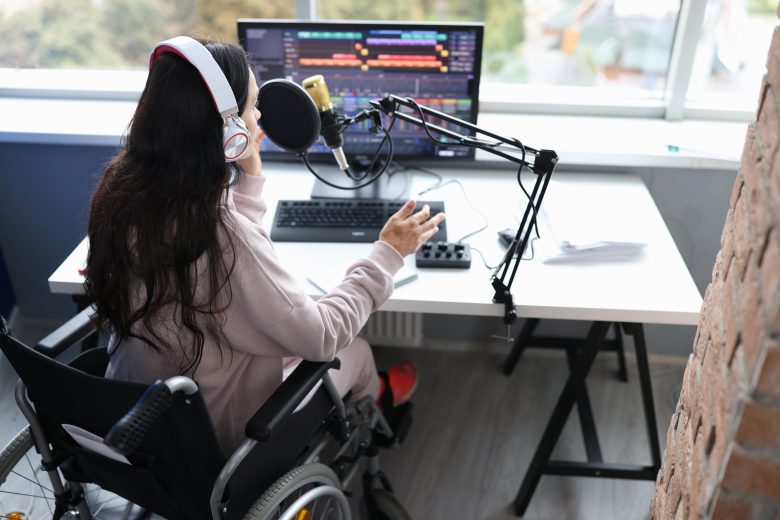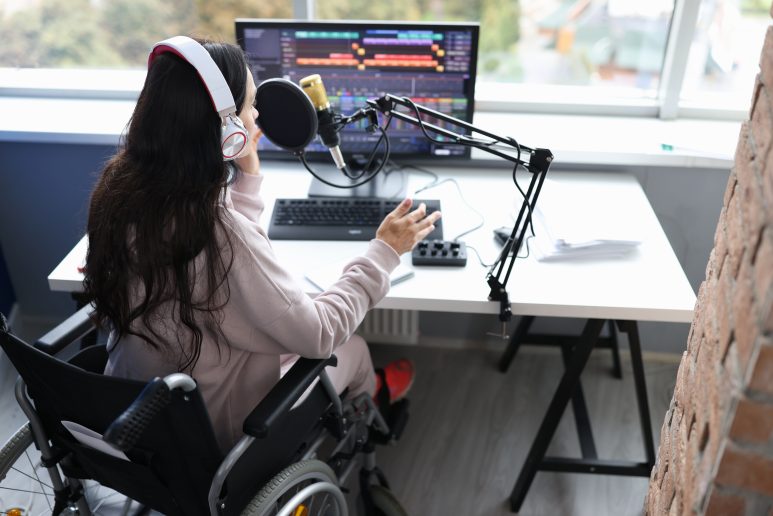By Harry Smith, Ability Today student and freelance journalist in collaboration with the Media Diversity Institute
“I’m going to ban my daughter from watching it for fear of it giving her nightmares”. In 2009 Cerrie Bernal received complaints when she was appointed a CBeebies presenter – Bernal was born with one arm. Eleven years later, Lauren Steadman, a British Paralympic athlete, reached the semi-final of Strictly Come Dancing. More recently, comedian Chris McCausland, who is registered blind, became a fan favourite on Strictly. We have come a long way.
However, there has been a time lag between this new-found representation and the media’s realisation that such portrayals should be shaped and guided by disabled people. Without this, the narratives consumed by audiences risk becoming distorted. The industry has started embracing the “nothing about us without us” philosophy. Channel 4 has run successful disability recruitment programmes, especially before the Paralympics.

Is it time for phase two in disability representation in the media?
That said, transforming such large entities takes time. A 2018 diversity and inclusion report into the BBC found efforts were still “tokenistic”. Without disabled people involved at the production level, there is a risk of creating reductive “boxes” for disabled characters and stories, which then perpetuate across society.
Similarly, while my friends are comfortable with my competitive running, they seem surprised to see me using dating apps. This reflects broader societal contradictions: while the Paralympics are celebrated, shows like The Undateables or Love on the Spectrum remain the primary depictions of disabled people in romantic contexts. Such shows, created by those outside the disabled community, fail to capture the subtleties of our experiences.
The “I’m Not a Participant” campaign on X, led by Paralympians like Jessica Long, the multi-gold-medal winning team USA swimmer, illustrates this issue. Elite athletes at the peak of their discipline often find their achievements framed as though they entered competitions on a whim, further diminishing their hard work.
Accurate portrayals are beginning to emerge, particularly through social media. Creators like “Blind Tobes,” a visually impaired Instagram influencer with millions of views, and Isaac Harvey MBE, who has transformed attitudes through social media, are reshaping narratives by showing both success and struggle.
Normalising our existence without reducing us to our disabilities
My journalism journey began with a desire to work on Channel 4’s Paralympics coverage, one of the first major platforms to actively recruit disabled creatives. Ironically, sports journalism seemed the only viable option in an industry where the narratives surrounding disability are deeply internalised. For society to understand the full scope of disabled lives, messaging needs to normalise our existence without reducing us to our impairments. Disabled people must be seen in contexts that include universal concerns like careers, romance, and health, while acknowledging how impairments shape but do not define those experiences.
Sex Education television series exemplifies this approach with the character Isaac, who navigates a love triangle while disability informs but does not dominate his story. This nuanced portrayal is the result of input from disabled writers like Rosie Jones, proving that change can happen when the right people are involved in decision-making.
Television has a proven capacity to foster empathy, but it’s essential that this empathy stems from accurate and respectful representations. As the first generation of disabled media professionals reaches decision-making roles, the next few years will be pivotal for shaping disability narratives. The media industry must seize this opportunity to ensure a more inclusive future.
There is already evidence, albeit anecdotal, that these cultural influences have an effect on the media landscape. Kris Edwards is now the assistant content director for The Breeze, one of New Zealand’s most prominent radio stations. He was told by a producer that he would have to work twice as hard because of his disability in order to succeed. He has had a 20-year career in radio and, for the majority of that, worked hard to minimise the visibility of his cerebral palsy.
In April of this year, Kris launched The Cerebral Palsy Podcast in conjunction with the radio show ‘The Breeze’, openly discussing his condition and its impact on his life. This was done with the aid and blessing of producers from the same organisation.
The power of social media
There is evidence that social media awareness is coalescing with mainstream media. Bella Roberts is an editorial trainee with a production company. Her passion for her career is obvious to anyone, but her road into the industry was far from straightforward. A film school graduate and award-winning editor, Bella grew increasingly frustrated when looking for her first editing role.
“ I was so used to going through interviews and feeling deflated because I knew I was not going to get the job.”
Media professionals will tell you this is not unusual. However, at this point 200,000 people were tuning into her social media to learn industry editing from her. Couple this with industry experience as a runner, and one is forced to look elsewhere to justify the rejections. Bella was born with lymphoedema, a disorder that prevents the body from processing excess fluid, leading to swelling of the skin.
When her frustration reached a peak, Bella made a video asking to be employed as an editor. She received hundreds of offers. Bella used social media to prove her passion. Her ability outweighed the perceived drawbacks that came from her disability.
This is the kind of power that other media professionals will be in a position to exercise in the coming years. Whether they have the confidence and awareness to exercise it will be the turning point. If so, authentic representations will have the opportunity to be supercharged into the mainstream in the coming decade.
Picture from https://www.shutterstock.com/fr/g/megaflopp
Disclaimer:
The views and opinions expressed in this article are solely those of the author and do not reflect the official policy or position of the Media Diversity Institute. Any question or comment should be addressed to [email protected]

